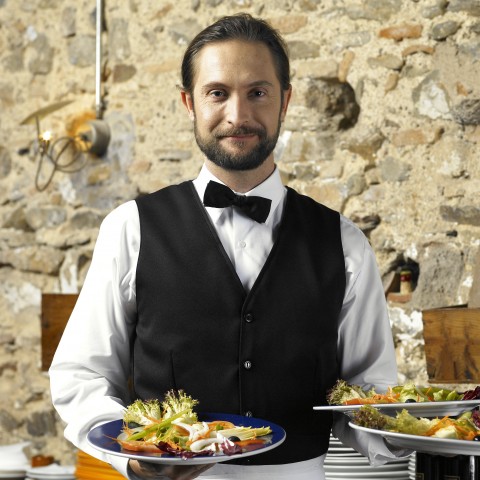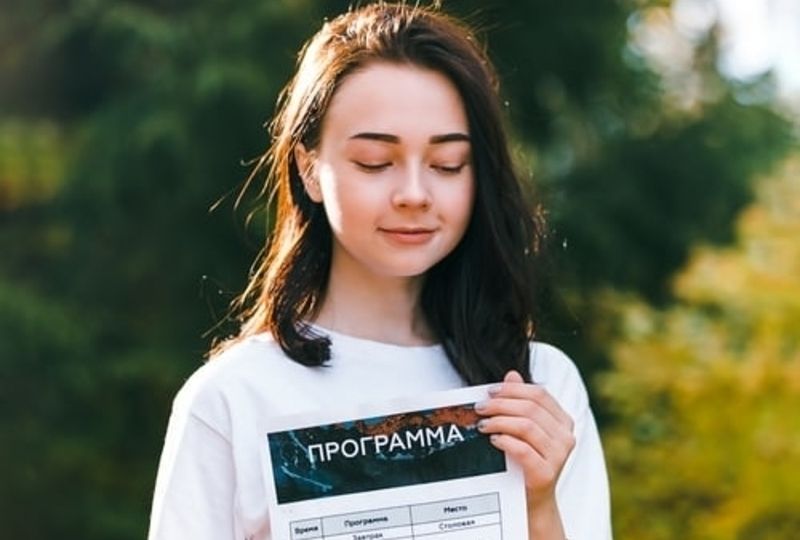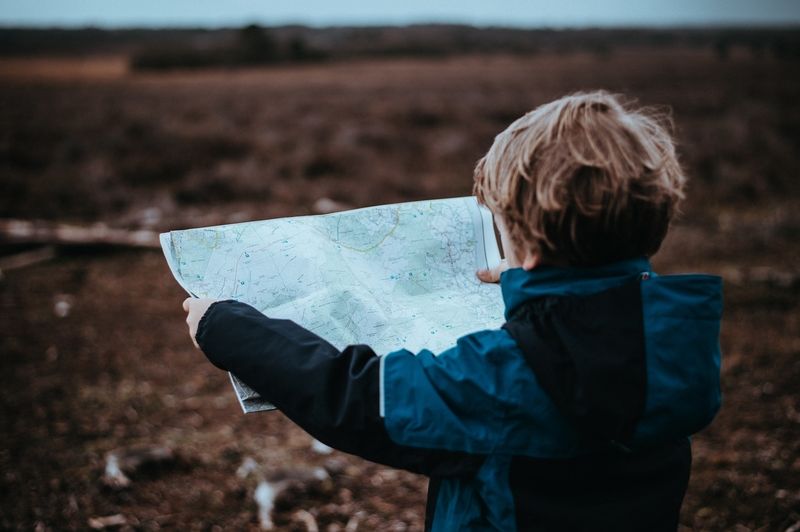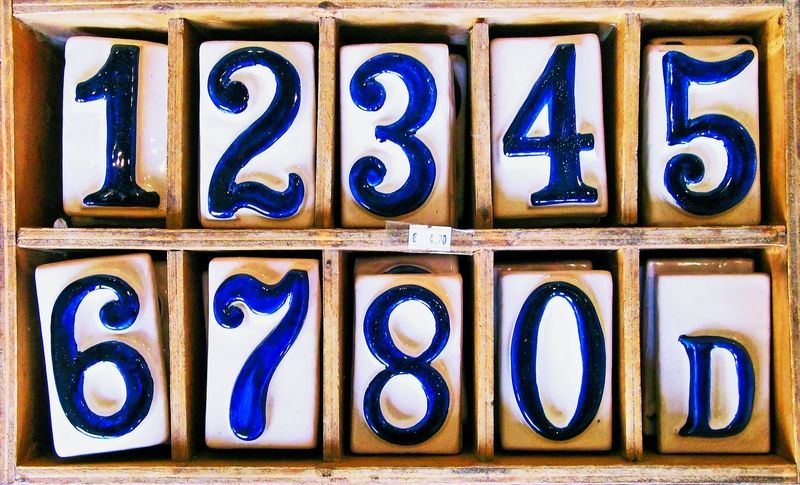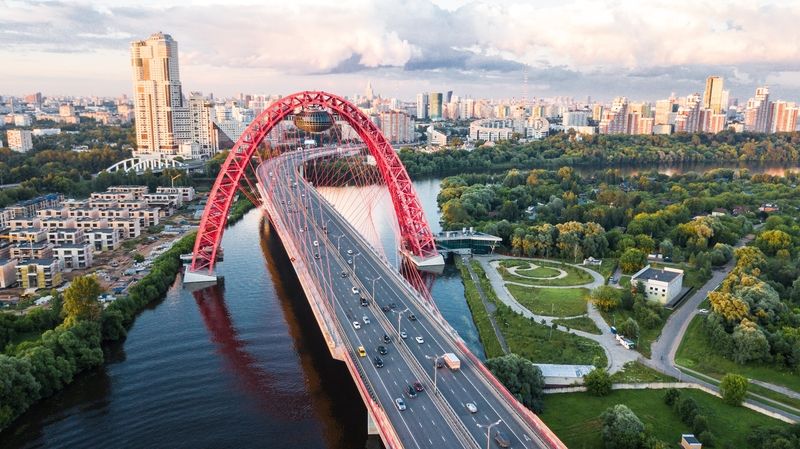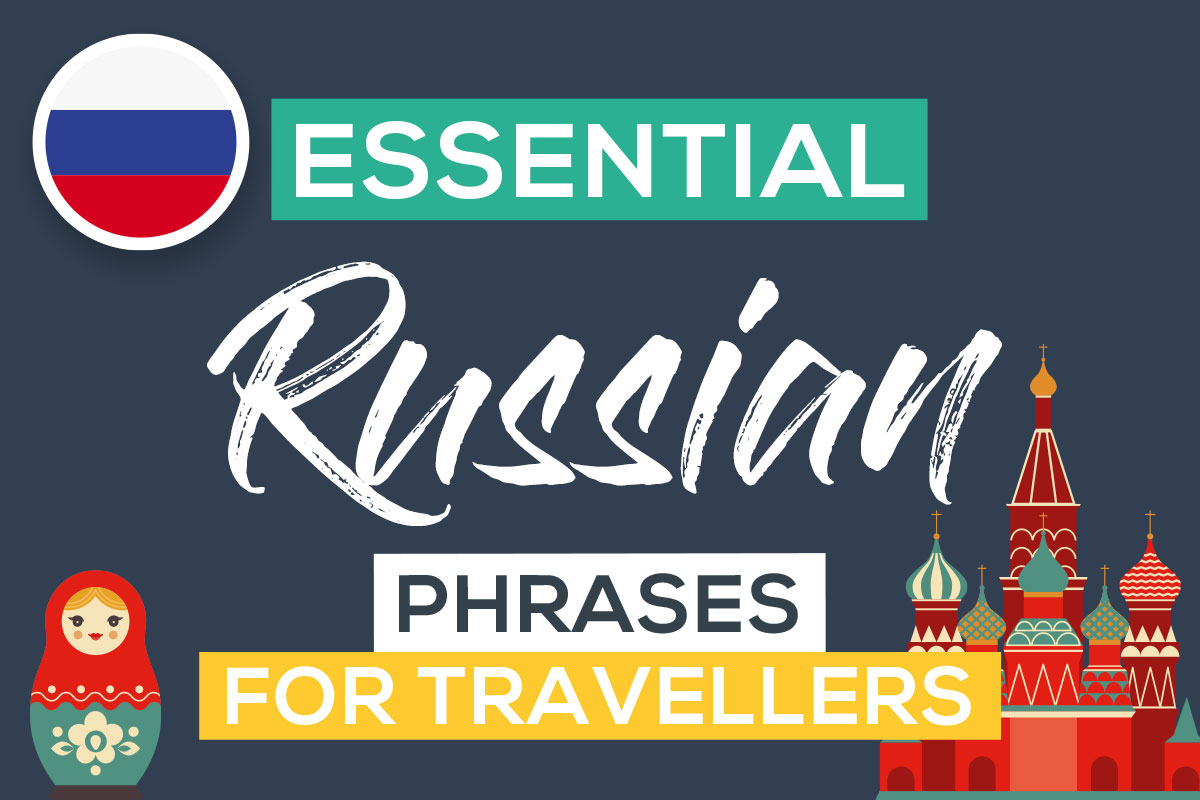VeranoVerde / Getty Images
Published on March 25, 2020
Russians love to travel and discover new places. As Russia is the largest country in the world, long distances don’t scare Russian adventurers. Use the vocabulary lists below to learn the essential Russian words and phrases related to travel and transportation.
Modes of Transportation
Russian cities usually have good transport systems. Rail and coach travel is popular and convenient, and many Russians like to travel by car, too.
| Russian | English | Pronunciation | Examples |
| Поезд | train | POyest | Едем на поезде (YEdem na POyezde) — We are on a train/going by train |
| Самолёт | airplane | samaLYOT | Летит самолёт (leTEET samaLYOT) — The airplane is flying/flies (to/from) |
| Машина | car | maSHEEna | Два часа на машине (dva chaSA na maSHEEne) — Two hours by car |
| Метро | subway | myTRO | Станция метро (STANtsiya meTRO) — A subway station/stop |
| Трамвай | tram | tramVAI | На трамвае до конечной (na tramVAye da kaNYECHnai) — On the tram until the last stop |
| Автобус | bus | afTOboos | Остановка автобуса (astaNOFka afTOboosa) — A bus stop |
| Троллейбус | trolleybus | tralLEYbus | Троллейбус переполнен (tralLEYbus perePOLnen) — The trolleybus is full |
| Такси | cab/taxi | takSEE | Возьмём такси (vaz’MYOM takSEE) — (Let’s/We’ll) get a taxi/cab |
| Маршрутное такси/маршрутка | routed cab | marSHROOTnaye takSEE | Надо ждать маршрутку (NAda ZHDAT’ marshROOTkoo) — We have to wait for the routed cab |
| Лодка | boat (rowing/dinghy/fishing) | LOTka | Маленькая лодочка (MAlen’kaya LOdachka) — A tiny boat |
| Корабль | ship | kaRABl’ | Капитан корабля (kapiTAN karaBLYA) — Captain of the ship |
| Вертолёт | helicopter | vyrtaLYOT | Подлетел вертолёт (padleTEL vertaLYOT) — A helicopter flew over |
| Катер | speedboat/cruiser | KAtyet | Речной катер (rechNOI KAter) — A river cruiser |
| Яхта | yacht | YAKHta | Огромная яхта (agROMnaya YAKHta) — A giant superyacht |
At the Airport
Larger cities in Russia have their own airports. There are many airlines in Russia, with Aeroflot being the biggest and one of the oldest airlines.
| Russian | English | Pronunciation | Examples |
| Билет | ticket | biLYET | Я забыл билет (ya zaBYL biLYET) — I forgot my ticket |
| Аэропорт | airport | ah-ehraPORT | Аэропорт Шереметьево (ah-ehraPORT shereMYET’eva) — The Sheremetyevo Airport |
| Рейс | flight | reiyss | Во сколько твой рейс (va SKOL’ka tvoi reiyss) — What time is your flight |
| Расписание | schedule | raspiSAniye | Посмотрим расписание (paSMOTrim raspiSAniye) — Let’s check the schedule |
| Зал ожидания | airport lounge | zal azhiDAniya | Он в зале ожидания (on v ZAle azhiDAniya) — He’s in the airport lounge |
| Бизнес-класс | business class | BIZnes klas | Она летит бизнес-классом (aNAH leTEET BIZnes KLASsam) — She’s flying business class |
| Эконом-класс | economy class | ehkaNOM klas | Билет эконом-класса (biLYET ehkaNOM KLASsa) — An economy ticket |
| Багаж | luggage | baGAZH | Забрать багаж (zaBRAT’ baGAZH) — To collect luggage |
Hotels
When traveling to Russia, keep in mind that hotels require a passport at the time of check-in.
| Russian | English | Pronunciation | Examples |
| Номер | room | NOmer | Вот ваш номер (vot vaash NOmer) — Here’s your room |
| Гостиница | hotel | gasTEEnitsa | Гостиница в центре Москвы (gasTEEnitsa f TSENTre maskVY) — A hotel in the center of Moscow |
| Рецепшн | reception | reTSEPshin | Спросите на рецепшн (spraSEEte na reTSEPshin) — Ask at the reception |
| Вестибюль | lounge | vestiBYUL’ | Большой вестибюль (bal’SHOI vestiBYUL’) — A spacious lounge |
| Тренажёрный зал | gym | trynaZHYORniy ZAL | Я иду в тренажёрный зал (ya iDOO f trenaZHYORniy zal) — I’m going to the gym |
| Бассейн | swimming pool | basSEIYN | Можно расслабиться в бассейне (MOZHna rasSLAbitsa v basSEIYne) — (We/You) can relax in the swimming pool |
On Vacation
Many Russians travel abroad for their vacation. The Black Sea coast is also popular with Russian holidaymakers.
| Russian | English | Pronunciation | Examples |
| Отпуск | vacation | OTpoosk | Когда у тебя отпуск (kagDA oo tyBYA OTpoosk) — When is your vacation? |
| Поездка | trip | paYESTka | Замечательная поездка (zameCHAtel’naya paYESTka) — A fantastic trip |
| Отдых | vacation/relaxation | OTdykh | Едем на отдых (YEdim na OTdykh) — We are going on vacation |
| Пляж | beach | plyash | Загорать на пляже (zagaRAT’ na PLYAzhe) — To sunbathe on the beach |
| Музей | museum | mooZEI | Лучшие музеи города (LOOCHshiye mooZYEyi GOrada) — The city’s best museums |
| Выставка | exhibition | VYStafka | Потрясающая выставка (patryaSAyushaya VYStafka) — An amazing exhibition |
| Лес | forest | lyes | Обожаю ходить в лес (abaZHAyu haDEET’ v lyes) — I love going to the forest |
| Горы | mountains | GOry | Вы едете в горы? (vy YEdyte v GOry) — Are you going to the mountains |
| Спа | spa | spa | Давай расслабимся в спа (daVAI rasSLAbimsya v SPA) — Let’s relax in the spa |
| Достопримечательности | sights, landmarks | dastaprimyCHAtelnasti | Смотреть достопримечательности (smaTRET’ dastaprimyCHAtelnasti) — To go sightseeing |
| Палатка | tent | paLATka | Разбивайте палатки здесь (razbiVAIte paLATki sdes’) — Set your tents here |
Going to explore gorgeous Moscow Kremlin or travel back into the XIX century on the tiny cobblestone streets of Saint Petersburg? Or maybe you’re coming to study or work in Russia? Whatever your goal is, knowing useful Russian phrases for tourists will make your life easier in this snowy country.
If you’ve had trouble finding travel guides when having road trips in Russia, look no further. RussianPod101.com is here to help you learn Russian travel phrases in English, so that your stay in Russia will be much more enjoyable and comfortable.
Please note that hotel staff in Russia usually speak English, so we’re not going to cover hotel phrases in this article. But once you leave your hotel, it’ll become a little bit trickier to find a person who knows English. In Moscow and Saint-Petersburg you’ll probably find an English-speaking person to help you out, but in smaller cities this becomes a real challenge. Thus, it’s definitely good to know at least a few Russian language travel phrases.
So, let’s get started with common phrases in Russian for travelers in our Russian travel phrases guide!
Table of Contents
- Basic Russian Phrases for Travel
- Transport
- Shopping
- Restaurant Phrases
- Asking for and Giving Directions
- Emergencies
- Flattery Phrases
- Useful Phrases to Go through Language Problems
- Conclusion
1. Basic Russian Phrases for Travel
Even if your language skills are poor—or if you’ve just opened this article in a last attempt to learn at least a couple of the most important words—then you’ve come to the right place! These fifteen basic Russian language travel phrases are just enough to show that you’re really trying. You may also gain a few points in the eyes of Russian people.
1- Спасибо (Spasibo)
This means “Thank you,” and is one of the most common Russian travel phrases. You can use it in any situation, both formal and informal. For example:
Спасибо за помощь (Spasibo za pomoshch) — “Thank you for your help.”
2- Пожалуйста (Pozhaluysta)
This is translated into English as “You are welcome,” or “Please…” For example:
Пожалуйста, дайте пройти (Pozhalusta, dayte proyti) — “Please, let me walk past you.”
3- Извините (Izvinite)
This means, “Excuse me, sorry.”
When it comes to travel phrases in Russian grammar, you can also ask for forgiveness with Простите (Prostite) — “Sorry.”
Check out our article about how to say “I’m sorry” in Russian if you want to know more.
4- Привет (Privet)
That means informal “Hi.” Alternatively, Здравствуйте (Zdravstvuyte)—is formal “Hello.” If you want to know more, please, read our article about Russian ways to say Hello.
5- Пока (Poka)
This easy word is an informal way of saying, “Bye.” Don’t hesitate to use it with people your age or younger when you meet them while traveling. For older people, use the formal До свидания (Do svidaniya) — “Goodbye. ”
6- Да (Da)
This simply means, “Yes.” An important word to remember, isn’t it?
You can emphasize your answer by adding Хорошо (Khorosho), meaning “Good,” so it sounds like Да, хорошо (Da, khorosho), meaning “Yes, okay.”
Or you can add “of course”: Да, конечно! (Da, konechno!), meaning “Yes, sure!” or “Yes, of course!”
7- Нет (Net)
This simple means, “No.” You can make your refusal more polite by adding words of gratitude: Нет, спасибо (Net, spasibo) — “No, thank you.”
8- Вы не могли бы меня сфотографировать (Vy ni mogli by menya sfotografirovat’)
This important phrase for every traveler means, “Please, could you take a picture of me.” If you wanna take a picture with other people, use Вы не могли бы нас сфотографировать (Vy ni mogli by nas sfotografirovat’), meaning “Please, could you take a picture of us.”
9- Я не говорю по-русски (Ya ne govoryu po-russki)
This basic Russian travel phrase means, “I don’t speak Russian.” It’s a nice phrase to know even if you do know Russian, right? To get rid of annoying salespeople. 
10- Хорошо (Khorosho)
This means “Good.” If things go better than good, use Отлично! (Otlichno!), meaning “Great! Perfect!” We hope that your Russian trip goes отлично!
Learn more conversational phrases from our vocabulary list.
By the way, do you know what the Russian word for “travel” is? It’s путешествовать (puteshestvovat’).
2. Transport
Transportation is one of the most vital aspects of a trip to anywhere, making Russian phrases for traveling related to this so important. Let’s look at some Russian travel words and phrases to help you find your way around Russia.
1- Taxi Phrases
Taxis are a popular way of transportation in Russia. Be aware of stopping the car on the street, because there are plenty of cases of robberies and fraudulent actions. The best way to order a taxi is through an app or by calling a taxi company. The prices will be absolutely the same as the prices of cars you stop on the street, and most of the time even lower.
You can use Uber or Yandex taxis (which works the same way as Uber). If you’re in a small city, you’ll probably be able to use either Uber or Yandex as well, but there might be less cars available, so give yourself a time cushion to account for searching for one. Or ask your friends or fellow travelers for a local taxi app.
Here are the phrases that will help you communicate with the driver:
- Мне нужно доехать до… (Mne nuzhno doyekhat’ do…) — “I need to get to… [location].” Use this phrase when you need to get somewhere using a transportation service.
- Остановите, пожалуйста… (Ostanovite, pozhaluysta…) — “Please, stop…” After that, add where you want to stop:
- …на остановке (…na ostanovke) — “…at the public transport stop.”
- …за перекрестком (…za perekryostkom) — “…after the crossroads.”
- …у светофора (…u svetofora) — “…near the traffic light.”
- …у следующего подъезда (…u sleduyushchego pod’yezda) — “…near the next entrance.”
- …у того подъезда (…u togo pod’yezda) — “…near that entrance.”
- …прямо здесь (…pryamo zd’es’) — “…right here.”
- …у того магазина (…u togo magazina) — “…on the public transport stop.”
- Можно остановить тут (Mozhno ostanovit’ tut) — “You can stop here.”
- Остановите, пожалуйста, чуть подальше (Ostanovite, pozhaluysta, chut’ podal’she) — “Please, stop a little bit further.”
2- Bus/Trolleybus/Tram/Metro Phrases
There are several means of public transportation in Russia—trams, trolleybuses, buses, and the metro. Use the following phrases to ensure that you don’t miss the right stop and to be polite during your ride:
- На какой остановке мне выходить? (Na kakoy ostanovke mne vykhodit’?) — “On which stop should I get off?”
- Подскажите, пожалуйста, какая следующая остановка? (Podskazhite, pozhaluysta, kakaya sleduyishchaya ostanovka?) — “Please, could you tell me what the next stop is?”
- Какая это остановка? (Kakaya eto ostanovka?) — “What stop is it now?”
- Сколько остановок до…? (Skol’ko ostanovok do…?) — “How many stops until… [location]?”
- Садитесь, пожалуйста (Sadites’, pozhaluysta) — “Sit, please.”
- In Russia, it’s considered polite to give up your seat for old people, pregnant ladies, and parents with little kids. It also looks really chivalrous when a guy gives up his seat for a girl.
Also, there’s one interesting means of public transport that’s not very common in other countries. It’s called маршрутка (marshrutka) — “route taxi.” It works like a shared taxi or a small bus, which drives along one route back and forth. Usually, it’s slightly more expensive than a bus/tram/trolleybus, but moves faster. It usually doesn’t stop on every public transport stop, so you’ll need to ask for a stop:
- На остановке остановите, пожалуйста… (Na ostanovke ostanovite, pozhaluysta…) — “Please, stop on the (next; nearest) public transport stop.”
- Use the phrase right before the needed stop. Remember to shout loud so the driver hears you. Don’t hesitate to shout one more time, if the driver has missed the stop and keeps driving: Остановите, пожалуйста! (Ostanovite, pozhaluysta!) — “Please, stop!”
To make public transportation more predictable, use the app Yandex Transport. After you set the starting point and final point of the route, the app shows you the fastest way to get there with the numbers of buses/route taxis/trams/trolleybuses needed. In big cities, such as Moscow and Saint Petersburg, you’ll also be able to see on the map where the needed bus is and how many minutes it will be until it arrives.
3- Suburban Train Phrases
If you want to travel between cities, especially if they’re four hours (or less) away from each other, consider taking a suburban sitting train. It’s usually quite cheap and fast. Unfortunately, for now you can’t buy a ticket online. You’ll have to buy a ticket at a ticket window or from a ticket machine. These are usually located on the way to the station before the security turnstile, or right at the station if it’s a smaller station. In 90% of stations, especially big ones, you’ll be able to pay by card.
These phrases will be useful for you:
- Электричка (Elektrichka) — “Suburban electric train.”
- Сколько стоит билет до…? (Skol’ko stoit bilet do…?) — “How much is the ticket to… [location]?”
- До…, пожалуйста (Do…, pozhaluysta) — “Ticket to… [location], please.”
- Где я могу купить билет на электричку? (Gde ya mogu kupit’ bilet na elektrichku?) — “Where can I buy a ticket on a suburban train?”
- Подскажите, пожалуйста, где туалет? (Podskazhite, pozhaluysta, gde tualet?) — “Please, tell me which way the bathroom is.”
4- Sleeping Train Phrases

Usually, tickets to sleeping trains are bought online, but you can also buy them at the ticket window on the station in advance.
While you’re on the train, you’ll probably have some questions. These phrases will help you deal with most of the situations that might occur:
- Когда мы приедем? (Kogda my priyedem?) — “When will we arrive?”
- Это какая станция? (Eto kakaya stantsiya?) — “What station is this?”
- Сколько стоим на этой станции? (Skol’ko stoim na etoy stantsii?) — “How long will we stay on this station?”
- У вас есть зарядка для… (U vas est’ zaryadka dlya…?) — “Do you have a charger for…?” (Where the blank space is the model of the phone.)
- …такого телефона? (…takogo telefona?) — “…this kind of the phone?” After that, show your phone.
- …Айфона? (…Ayfona?) — “…iPhone?”
- …Самсунга? (…Samsunga?) — “…Samsung?”
- Как пройти в вагон-ресторан? (Kak proyt’i v vagon-restoran?) — “How can I get to the restaurant-carriage?”
- Где можно покурить? (Gde mozhno pokurit’?) — “Where could I smoke?”
- Курить запрещено (Kurit’ zapreshcheno) — “Smoking is prohibited.” Usually, it’s prohibited to smoke on the trains, though people do it on stops outside.
- Проводник (Provodnik) — “Train conductor.” The provodnik’s room is located at the beginning of each wagon. You can ask him any questions during your trip.The provodnik usually checks tickets, and provides bed-clothes and food if it’s included in your ticket. Most of the time, the provodnik reminds you in advance about your stop, but still be careful and in control about where you should get off the train yourself. You can also order a tea from provodnik, but be ready to pay for it:
- Сколько стоит чай? (Skol’ko stoit chay?) — “How much does the tea cost?”
- Зеленый чай (Zelyonyy chay) — “Green tea”
- Черный чай (Chyornyy chay) — “Black tea”
- Вагон (Vagon) — “Wagon.” You’ll probably buy a ticket for one of these types of wagons:
- Плацкарт (Platskart) — “Open plan carriage.” This is the cheapest kind of carriage. Open plan coach has no separate rooms.
- Купе (Kupe) — “Сompartment.” There are separate rooms in these. Each room in a compartment coach has four beds: two upper ones and two lower ones. Upper ones are usually cheaper because you need to be physically fit to climb into them.
- СВ (Es Ve) — “Sleeping wagon.” This is the most expensive type. A sleeping wagon consists of separate rooms with two beds in each room.
- Постельное белье (Postel’noye bel’yo) — “Bed-clothes.” When you’re booking the ticket, check if they provide the bed-clothes or not. If you plan to sleep during your trip, then it’s better to include it in your ticket. However, nobody will blame you if you bring and use your own bed-clothes or a sleeping bag to lower your travel expenses.
3. Shopping
While you’re traveling, you may need to buy food from a shop, some souvenirs, or even hunt for great deals on clothes and other goods. This list has everything you need to know to feel comfortable while shopping:
- Рубль (Rubl’) — “Ruble.” This is the Russian currency. Learn more about the Ruble in our short video.
- Сколько это стоит? (Skol’ko eto stoit?) — “How much does it cost?”
- Вы не могли бы сделать скидочку? (Vy ne mogli by sdelat’ skidochku?) — “Could you give me a discount?”
- Что посоветуете? (Chto posovetuyete?) — “What would you recommend?”
- Дайте, пожалуйста, это (Dayte, pozhaluysta, eto) — “Give me this, please.”
- Картой можно оплатить? (Kartoy mozhno oplatit’?) — “Can I pay by card?”
- If you travel to smaller cities, paying by credit card might not be an option. You may hear a Russian salesperson offer you: Можете перевести на Сбербанк (Mozhete perevesti na Sberbank) — “You could transfer money to Sberbank.” This means that you can make a wire transfer to a Russian bank account.
- Sberbank is the most common bank in Russia. Please, note that if you transfer from a foreign bank account, the commission may be taken. Also, if you transfer from a Russian bank, whether Sberbank or another one, the commission might be taken as well. Please, carefully check this option with your bank in advance.
- Оплата наличными? (Oplata nalichnymi?) — “Should I pay by cash?”
Talking about prices requires knowing Russian numbers. Learn how to count in Russian and how to use these numbers in shopping phrases in our article.
4. Restaurant Phrases
Eating local food in local restaurants is usually one a “must” during a trip. And you, for sure, don’t wanna miss trying out traditional Russian food. Of course, you might have food or beverage preferences, or just want to feel free when communicating with waiters, so our list with the most important phrases will come in handy:
- Меню, пожалуйста (Menyu, pozhaluysta) — “Bring the menu, please.”
- Мне, пожалуйста, это (Mne, pozhaluysta, eto) — “Give me this one, please. ” This way, you can smartly avoid pronouncing the name of the dish. Just point to the picture, to the menu item, or to the food on the shop window.
- Воду, пожалуйста (Vodu, pozhaluysta) — “Craft beer.”
- Вода с газом (Voda s gazom) — “Sparkling water, soda.”
- Газированная вода (Gazirovannaya voda) — “Sparkling water, soda.”
- Вода без газа (Voda bez gaza) — “Still water.”
- Негазированная вода (Negazirovannaya voda) — S”till water.”
- Пиво, пожалуйста (Pivo, pozhaluysta) — “Beer, please.”
- Светлое пиво (Svetloye pivo) — “Light beer.”
- Темное пиво (Tyomnoye pivo) — “Dark beer.”
- Нефильтрованное пиво (Nefil’trovannoye pivo) — “Unfiltered beer.”
- Крафтовое пиво (Kraftovoye pivo) — “Craft beer.”
- Я вегетарианец (Ya vegetarianets) — “I’m a vegetarian.”
- Я веган (Ya vegan) — “I am vegan.” Please, note that your waiter probably won’t know the difference between being a vegan and being a vegetarian. Check out the list of ingredients on the menu carefully, and if you order a salad, ask them to bring the sauce (dressing) separately, just in case: Соус отдельно, пожалуйста (Sous otdel’no, pozhaluysta) — “Bring the sauce separately, please.”
- Я не ем мясо. Какие у вас блюда без мяса? (Ya ne yem myaso. Kakiye u vas blyuda bez myasa?) — “I don’t eat meat. Which dishes are without meat?”
- У меня аллергия на… (U menya allergiya na…) — “I’m allergic to…”
- Это очень вкусно! (Eto ochen’ vkusno!) — “It’s really tasty!”
- Официант! (Ofitsiant!) — “Waiter!”
- Посчитайте, пожалуйста (Poschitayte pozhaluysta) — “Bring the bill, please.” You’ll sound really “Russian” if you use this phrase. Literally, the translation is “Count, please.”
- Счет, пожалуйста (Shchot, pozhaluysta) — “Bill, please.”
- Оплата картой (Oplata kartoy) — “Payment by card.”
- Оплата наличными (Oplata nalichnymi) — “Payment by cash.”
If you want to feel even more confident in a Russian restaurant, check out our restaurant vocabulary list.
5. Asking for and Giving Directions
Getting lost in a foreign country is a terrifying thing. That’s why it’s important to make sure to remember basic Russian expressions—or even print them out on paper in case your phone dies:
- Где я? (Gde ya?) — “Where am I?”
- Где находится… (Gde nakhoditsya…?) — “Where is… [location] located?”
- Подскажите, пожалуйста, где ближайший туалет? (Podskazhite, pozhaluysta, gde blizhayshiy tualet?) — “Please, could you tell me where the nearest bathroom is?”
- Как мне дойти до…? (Kak mne doyti do…?) — “How can I get to… [location]?”
- Идите… (Idite…) — “Go…”
- …прямо (pryamo) — “…straight”
- …направо (napravo) — “…to the right”
- …налево (nalevo) — “…to the left”
- …туда (tuda) — “…that way”
- …сюда (syuda) — “…this way”
If you feel like going into the wild—and we know that Russian wilderness can be amazingly beautiful and attractive for hiking-lovers—study our vocabulary list with direction words that will come in handy when you use the map.
6. Emergencies
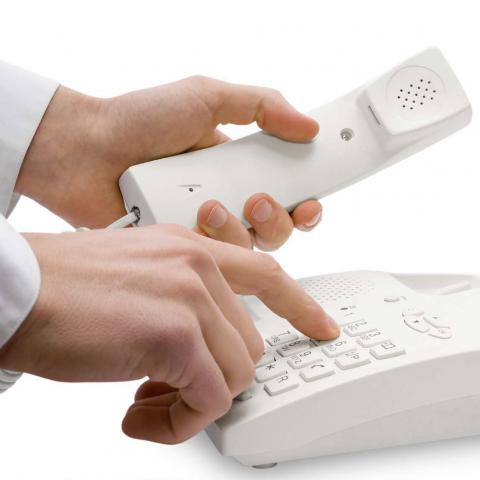
The Russian emergency number is 112. The operator will redirect your call to the police, ambulance, fire brigade, gas alarm, or rescuers.
- Помогите! (Pomogite) — “Help me!”
- Спасите! (Spasite!) — “Save me!”
- Пожар! (Pozhar!) — “Fire!”
- Вызовите скорую! (Vyzovite skoruyu!) — “Call an ambulance!”
- Здесь есть доктор? (Zdes’ yest’ doctor?) — “Is there a doctor?”
-
Я потерял свой паспорт (Ya poteryal svoy pasport) — “I’ve lost my passport.” (For a male.)
- Я потеряла свой паспорт (Ya poteryalа svoy pasport) — “I’ve lost my passport.” (For a female.)
- Я потерял свой кошелек (Ya poteryal svoy koshelyok) — “I’ve lost my purse.” (For a male.)
- Я потеряла свой кошелек (Ya poteryalа svoy koshelyok) — “I’ve lost my purse.” (For a female.)
Study our vocabulary list with more words and phrases for emergency situations.
7. Flattery Phrases

When you travel in a foreign country, you’ll probably get a chance to make new Russian friends. Learn some phrases to leave a good first impression:
- Мне нравятся русские (Mne nravyatsya russkiye) — “I like Russians.”
- Я люблю русскую еду (Ya lyublyu russkuyu yedu) — “I love Russian food.”
- Я люблю Россию (Ya lyublyu Rossiyu) — “I love Russia.”
- Я хочу быть твоим другом (Ya khochu byt’ tvoim drugom) — “I wanna be your friend.”
- У тебя есть Фейсбук или Инстаграм? (U tebya yest’ Feysbuk ili Instagram?) — “Do you have Facebook or Instagram?”
8. Useful Phrases to Go through Language Problems
Well, even if you’ve learned all the phrases above, in some situations, the phrase you need may disappear from your memory or you might not understand what that gloomy Russian is saying. Don’t worry, just use the following phrases:
- Вы говорите по-английски? (Vy govorite po-angliyski?) — “Do you speak English?”
- Я не понимаю (Ya ne ponimayu) — “I don’t understand.”
- Вы не могли бы повторить? (Vy ne mogli by povtorit’?) — “Could you repeat, please?”
- Пожалуйста, говорите помедленнее (Pozhaluysta, govorite pomedlenneye) — “Please, speak more slowly.”
- Я не говорю по-русски (Ya ne govoryu po-russki) — “I don’t speak Russian.”
- Напишите это, пожалуйста (Napishite eto, pozhaluysta) — “Write it down, please.”
- Как это читается? (Kak eto chitayetsya?) — “How do you read this?”
9. Conclusion
We hope you now know why travel phrases, to learn Russian, are so vital. Travel phrases in Russian language learning provide you with helpful information for when you’re in a pinch, and also give you cultural context to make learning easier and more relevant!
Make sure that you return to the basic Russian words for tourists list and look through it one more time, as it’s the most important part of the article. Believe me, Russian people will be kinder to you once they understand that you’ve come prepared. Having some travel phrases in your Russian vocabulary is the first step to a good first impression.
Remember that knowing and using foreign words are totally different skills. Find a Russian-speaking language partner to practice or consider taking some lessons with our MyTeacher program for Russian-learners to start using the vocabulary for free and to feel more comfortable while you’re staying in Russia. Our teachers are native Russians and they’ll help you digest the most important and useful Russian phrases for tourists.
We wish you a great Russian journey that you’ll remember with excitement for a long time!
The Russian language is wonderful if you’re travelling through a country like Ukraine, Belarus, Kazakhstan, and of course Russia itself! Overall, there are about 250 million Russophones spread over East Europe and Central Asia. No doubt, you’ll find plenty of places there that are more than worth visiting.
If you’re planning to travel through any Russian speaking country, English is only going to take you so far. While a lot of people speak it, you’ll have a much easier and enjoyable time if you have some Russian under your belt. So a toolbox of some basic Russian words and phrases will make your experience more fun and give you a chance to impress the locals. It will also help you improve your Russian in no time.
So for this article we’re going to give you the 101 more important Russian phrases for travelling.
The Absolute Essential Russian Words for Travel
Below we’ve gone over a range of topics to give you 101 essential phrases for Russian travel. This goes from the very basics to ordering out at a restaurant and what to say in an emergency. So with these basic phrases in Russian, you should have no problem introducing yourself, shopping, or travelling in a Russian speaking area.
The Very Basic Russian Phrases.
So let’s get things started with the very, very basic words that you’ll need to get by. This includes things like hello, yes, and no.
- Здравствуйте. Hello (formal)
- Привет. Hello (less formal)
- Доброе утро. Good morning
- Добрый день. Good day/good afternoon
- Добрый вечер. Good evening
- Очень приятно. Nice to meet you
- Пожалуйста. Please
- Спасибо. Thank you
- Пожалуйста. You’re welcome
- Не за что. You’re welcome (less formal)
- Да. Yes
- Нет. No
- Извините. Excuse me. (getting attention or begging pardon).
- Простите. Excuse me. (begging pardon)
- Простите. I’m sorry
- где туалет? Where’s the toilet?
- Что это такое? What is this?
- Это. This thing
- До свидания. Goodbye
- Пока. Goodbye (informal)
Communication Problems in Russian
Of course, you’re bound to run into a few problems trying to communicate in Russian. For that you can use these phrases to make things easier.
- Я не говорю по-русски (хорошо). I can’t speak Russian (well)
- Вы говорите по-английски? Do you speak English?
- Здесь кто-то говорит по-английски? Is there someone here who speaks English.
- Я не понимаю. I don’t understand
- Я не знаю — I don’t know
- Я не услышал/а — I didn’t hear you (m/f)
- Повторите, пожалуйста. Can you repeat that?
Introducing Yourself in Russian
Now that we’ve gone over the communication essentials in Russian, we can move onto the fun stuff. The parts where you actually get to talk about yourself and others.
- Как Вас зовут? What is your name?
- Меня зовут … . My name is … .
- Откуда вы? Where are you from?
- Я из ….. I’m from
- Как дела? How are you?
- Хорошо. Good/well
- Не хорошо. Not good
- Плохо. Bad(ly)
Numbers-How to Count in Russian
If you’re travelling, you’re going to be shopping and that means knowing your numbers is absolutely essential. Take a look at the list below, so you know how much money to give the shopkeeper at the restaurant or kiosk.
- Один. one
- Два. two
- Три. three
- Четыре. four
- Пять. five
- Шесть. six
- Семь. seven
- Восемь. eight
- Девять. nine
- Десять. Ten
- Двадцать. Twenty
- Тридцать. Thirty
- Сорок. Fourty
- Пятдесят. Fifty
- Шестьдесят. Sixty
- Семьдесят. Seventy
- Восемьдесят. Eighty
- Девяносто. Ninety
- Сто. One hundred.
- Сколько стоит? How much does it cost?
Ordering Food and Eating Out in Russian
Of course, once you know how to talk about numbers you should also get ready to go out and enjoy some food. If you’re in Russia, you’ll have a lot of options for cuisine including borsch, shchi, and shashlyk. You can find something at a kiosk, restaurant, or bar. So find something вкусный (tasty).
- Ресторан. Restaurant
- Бар. Bar
- Вода. Water
- Завтрак. Breakfast
- Обед. Lunch
- Ужин. Dinner
- Я хочу… I want…
- Дайте….., пожалуйста ….. I’d like a …. please
- Кофе. Coffee
- Суп. Soup
- Чай. Tea
- Я вегетарианец. I’m a vegetarian
- я не ем свинину. I don’t eat pork
- я не ем мясо. I don’t eat meat
- Я принимаю только кошерную пищу. I only eat Kosher
- Счёт, пожалуйста. Check, please
Travel And Transport
If you don’t plan to spend all of your time in one spot, it’s good to know how to get somewhere else.
- Билет. Ticket
- Автобус. Bus
- Поезд. Train
- Такси. Taxi
- Лет. Flight
- Метро. Subway/metro
- Когда? When?
- Сколько времени? At what time?
- Который час? At what time?
- Один билет в …. , пожалуйста. One ticket to … please.
Directions
- Как добраться до … ? How do I get to…?
- где находится…? Where is the…?
- Хостел. Hostel
- Гостиница. Hotel
- Улица. Street
- Направо. To the right
- Налево. To the left
- Вперёд. Straight ahead
- Это недалеко отсюда. It’s not far away from here.
- Это очень далеко. It’s very far.
Emergencies
Hopefully, you’re trip to a Russian speaking country will go smoothly and without any problems. But it’s always good to be prepared. So if you find yourself in a difficult situation, you’ll know just what to say.
- Полиция! — Police
- Мне нужна ваша помощь. I need your help
- Это срочно! It’s an emergency.
- Я заблудился/заблудилась — (m/f).) I’m lost
- Я потерял(а) свою сумку. I lost my bag (m/f)
- Я потерял(а) свой бумажник. I lost my wallet (m/f)
- Я потерял(а) свой паспорт. I lost my passport (m/f)
- Я болен (m.) / Я больна (f.) I’m sick
- Я ранен(а) I’ve been injured (m/f)
- Мне нужен врач. I need a doctor
How to Learn Basic Russian Vocabulary
What we’ve put down here will give you a great start into exploring the culture and people of so many Russian speaking countries and regions. However, if you want to go further in learning the Russian language, the only way is with plenty of practice. And for practicing Russian and more you can rely on Speechling!
With Speechling, you can listen to plenty of basic phrases in Russian and then practice saying them yourself. Then our language coaches will give you tips so that you can move from the basics of Russian to higher and higher levels until your talking with native speakers with ease!
The Intrepid Guide contains affiliate links. At no cost to you, I will earn a commission which helps reduce the ever-increasing costs of keeping this site active. Thank you for your support.
Visiting Russia or just want to learn basic Russian words? Then you need to learn these essential Russian phrases for travel. Plus, 6 travel tips and surprising local customs you should know.
Many believe Russian to be one of the hardest foreign languages to master and feel apprehensive about learning it. Like any foreign language, Russian is not without its difficulties. However, it is also a beautiful language full of hilarious Russian idioms making any challenges you face quite fun to overcome.
You don’t have to learn the entire Russian language to be travel fluent. Just being able to understand the most useful Russian phrases and expressions will make all the difference when it comes to comprehension. In this guide, we will take a look at the Russian language, its history, its alphabet, and some of its features that can present challenges for the learners or that every Russian learner (and traveller) should know about.
If you’re a more serious learner, then make sure you join Uncovered Russian which will take even complete beginners to a solid intermediate level al by using the power of Story Learning. Get your FREE trial of Uncovered Russian here.
Let’s take a closer look at the Russian language. Here’s what we’ll cover:
Table of Contents
- How Many People Speak Russian?
- Where is Russian spoken?
- A Quick History of Russian
- Russian Alphabet
- Russian pronunciation
- Russian Grammar
- 6 Top Travel tips and Russian Culture
- Russian words in the English language
- 5 Interesting facts about the Russian language
- Russian Phrases for Travel
- Common Greetings
- How to be Polite
- Asking Questions
- Eating out and Ordering Food
- Food and Ingredients
- Getting Around
- Directions
- Sightseeing
- Numbers
- Telling the time
- Days of the week
- Emergencies
- Shopping
- Expressions of encouragement
- Essential Russian Phrases for Travel [Printable Infographic]
How many people speak Russian?
With over 250 million speakers all over the world, Russian is the world’s eighth most widespread language. It is the official language of Russia, with a population of nearly 150 million people, as well as Belarus, Kyrgyzstan, and Kazakhstan.
Where is Russian spoken?
Russian is also rather wide-spread in the former Soviet republics, which include Azerbaijan, Estonia, Georgia, Latvia, Lithuania, Moldova, Tajikistan, Turkmenistan, Ukraine, and Uzbekistan.
There are considerable communities of Russian-speakers in other countries of the world, including Cyprus, Finland, Turkey, Hungary, Mongolia, Poland, Canada, Australia, China, the United States, Argentina, and Israel. In the USA, there are over a million Russian speakers, with more than 100,000 in California alone.
A quick history of Russian
Russian is an Indo-European language. This means that if we go back in history, it has the same roots as English or French – but we will have to go way back for that, as the ancient Proto-Indo-European is believed to have been spoken as a single language from 4500 BCE to 2500 BCE.
At around 1500–1000 BCE, the Proto-Slavic language emerged, the language spoken by the Slavic tribes that began to settle in Eastern Europe. This language eventually developed into the Slavic branch of the Indo-European language family, including such languages as Russian, Czech, Polish, Bulgarian, Serbo-Croatian, and others.
As a separate language, Russian emerged in the middle ages. It was heavily influenced by Church Slavonic used by the Russian Orthodox Church at that period. Between the 15th and 17th centuries, various attempts at standardizing the Russian language were made. Eventually, standard Russian, based on the Moscow dialect, became the official language of the country in the mid-19th century.
Russian dialects are roughly divided into Northern, spoken in the northern and north-eastern parts of European Russia; Southern, spoken in the western and southern parts of European Russia; and Central or Middle, located between the two. The dialects of Siberia and the Far East can be of any of these three groups, depending on where the settlers of this or that region came from. There are also smaller local variations and dialects of Russian spoken in other countries, such as Kazakhstani or Kyrgyzstani Russian.
The Russian alphabet (Алфавит)
Russian is written using the Cyrillic alphabet. This alphabet was developed in the 9th century CE, based on the Greek script with the addition of several laters of the old Glagolitic alphabet. The alphabet underwent several reforms until its ‘final’ version after the reforms of Peter the Great in the 18th century.
The modern Russian alphabet has twenty consonants, ten vowels, one semi-vowel, and two modifier letters that change a preceding consonant but are not pronounced themselves.
Below is a table of the Russian alphabet including pronunciation. I’ve you’re not familiar with how to use the International Phonetic Alphabet (IPA), I’ve also included the closest equivalent transliteration.
| Russian Letter | Transliteration | IPA (International Phonetic Alphabet) |
|---|---|---|
| А | a | a |
| Б | b | b |
| В | V | v |
| Г | G | ɡ |
| Д | D | d |
| Е | E | je |
| Ё | YO | jo |
| Ж | ZH | ʐ |
| З | Z | z |
| И | I | i |
| Й | J | j |
| К | K | k |
| Л | L | l |
| М | M | m |
| Н | N | n |
| О | O | o |
| П | P | p |
| Р | R | r |
| С | S | s |
| Т | T | t |
| У | U | u |
| Ф | F | f |
| Х | H | x |
| Ц | TS | ts |
| Ч | CH | tɕ |
| Ш | SH | ʂ |
| Щ | SHCH | ɕː |
| Ъ | – | – |
| Ы | Y | ɨ |
| Ь | – | ʲ |
| Э | E | e |
| Ю | YU | ju |
| Я | YA | ja |
The Russian alphabet can seem confusing at first. There are letters that look like the letters in English and have relatively similar sounds (а, к, м), but there are also letters that look familiar but are pronounced differently (н, р, х) and letters that look completely unfamiliar and weird (ж, ф, ы).
One of the best ways to learn the Russian alphabet is to ‘divide and conquer’ the letters:
- Start with the friendliest ones, that look and sound similar to the letters of the English alphabet: A, E, K, M, O, and T.
- Move on to letters that look different but represent familiar sounds: Б, Г, Д, Ш, З, Ф, П, Л, Э, Ч, И, and Ю.
- Then you can tackle the letters that represent sounds that don’t exist in the English language (Ё, Ж, Й, Щ, Ц, Я, Ь, Ъ,
- and Ы) and the tricky ones that look familiar but sound differently (B, H, P, C, У, and X).
My tip? Don’t rush this process. Take your time to practice these letters sufficiently. The alphabet is one of the basics of any language, and you wouldn’t want to go back to revise it when you start learning more complex things.
Russian pronunciation
Russian pronunciation is fairly phonetic: one letter usually corresponds to one sound and words are pronounced just as they are written. See if you can read these Russian words: том, кот, мама, ком. You can probably pronounce them well enough even without any knowledge of Russian.
But of course, things are never that simple and there are a few rules you need to remember to pronounce and read Russian correctly. Here are a few of them:
- The Russian /r/ is rolled. Try saying words like ‘bottle’ or ‘butter’ really fast to achieve a similar sound. You can also check out YouTube tutorials on how to roll your /r/.
- The unstressed O is pronounced as /a/ – корова (cow) is pronounced /ka-rO-va/.
- The vowels Е, Ё, Ю, and Я usually palatalize the previous consonant.
- A consonant at the end of the word is always unvoiced. That’s why the word ‘код’ (code) is pronounced /кот/, the same way as the word ‘кот’ (cat).
- The letter Ё is always stressed.
- The soft sign Ь is not pronounced, it indicates that the previous consonant is palatalized: кровь (blood) – /krov’/.
- The hard sign Ъ acts like a ‘silent back vowel’ and separates the consonant from the following soft vowel, and indicates that this vowel is iotized: объект (object) – /ob’’yekt/.
These are just a few of the basic rules to get you started. Of course, you will need to study Russian pronunciation in more detail to speak the language correctly.
Russian grammar
Russian is a heavily inflected language, meaning, where an English noun or verb has just two or three forms, Russian words can have dozens of forms to correspond to different cases, tenses, and other grammatical structures.
No article would be enough to describe in detail the grammar of the Russian language – you’ll need at least one hefty textbook for that, if not more. We will only touch upon some of the key features of Russian grammar that are important to learn even if you are brushing up on your Russian for a short trip.
Gender
Nouns in Russian have the category of gender: each noun is masculine, feminine, or neuter. The grammatical gender has nothing to do with the physical characteristics of an object and can be hard to remember. There are just a few words describing men and women, family members, and professions whose grammatical gender (masculine or feminine) corresponds to the actual gender of the person they describe. Example: учитель (masc., a (male) teacher), учительница (fem., a (female) teacher). The gender of nouns is important to remember because it affects other parts of speech: adjectives, pronouns, and even verbs in some of the forms.
Politeness: Using the formal and informal ‘you’
The English language has just one form of ‘you’ that is used for the second person both singular and plural, in both formal and informal situations. In Russian, 2nd person singular is ‘ты’ and 2nd person plural is ‘вы’. The capitalized ‘вы’ is also used to address one person in a formal situation. In this case, plural verbs are also used. Example: Ты хорошо выглядишь – You look nice (2nd person singular, informal); Вы хорошо выглядите – You look nice (2nd person, plural or 2nd person singular, formal). When meeting someone for the first time, the polite form is preferable until you get to know them better or you mutually agree to use the more informal ‘ты’.
Cases
There are six cases in the Russian language, and a Russian noun thus has 12 different forms (6 singular and 6 plural). Adjectives and pronouns have to agree with the nouns they describe in number, gender, and case, so they have quite a few different forms as well. Cases may be one of the most ‘annoying’ parts of Russian grammar, with all the different inflections you have to remember. However, it is mostly a matter of repetition and regular practice – and with a bit of effort and patience, you’ll be the master of Russian cases.
6 Top Travel tips and Russian Culture
When travelling to a foreign country, it is important to know a little about its culture and traditions. In Russia, people are generally quite welcoming to foreigners, and there aren’t many strict cultural rules breaking which can lead to severe misunderstanding.
The most important rule is to be polite, attentive to others, and open-minded. However, following some of the common customs and traditions will help you avoid misunderstandings and generally have a great time in Russian. Here are a few of them:
- Bring a gift. When you are invited to someone’s home, especially for the first time or for some holiday, it is a good idea not to come empty-handed: bring some flowers to the hostess, some dessert or a bottle of wine, a souvenir from your country. And don’t forget to take off your shoes when you enter the house or apartment! You can ask your host for some ‘tapochki’ (slippers) instead.
- Don’t smile too much. At a first glance, Russian people can seem rather gloomy and unsmiling. A smile is quite personal in Russia, so don’t expect people on public transport or in the streets to smile back at you.
- Respect the elderly. When using public transport, it is a common sign of respect to give up your seat to elderly people.
- Follow the dress-code. It is customary to dress more formally when going to a theatre or to a restaurant. You will often still be let in wearing jeans and a T-shirt, but it is quite likely that you will stand out in the crowd of smartly-dressed Russians.
- Tip the waiters. It is common to tip around 10% of the bill.
- Be formal to be on the safe side. We’ve already discussed formality in the grammar section – if you are not sure if it’s okay to use the informal ‘ты’ and corresponding verb forms, go with the formal forms. This way you’ll never seem disrespectful, and if it’s okay to use ‘ты’, people will often tell you.
Russian words in the English language
There are quite a few words borrowed from English in the Russian language (банк – bank, компьютер – computer, креатив – creativity, менеджер – manager, хот-дог – hot-dog, бар – bar, доктор – doctor, and many others). But did you know that there are words of Russian origin in the English language as well?
Many of these words are connected with Russian cuisine, culture, and history: blini, pirozhki, vodka; glasnost, kadet, okrug, perestroika, soviet; raskol, shaman; kalashnikov, marshrutka.
There are also words related to space exploration (cosmonaut, cosmodrome, sputnik) and the names of some animals (beluga, mammoth, sable).
5 Interesting facts about the Russian language
There are a lot of interesting things about the Russian language – some we have already mentioned above and you will probably learn many more when you start learning the language. Here are a few facts about Russian to keep you interested:
- Russian is the language of space. English and Russian are the two languages used on the International Space Stations, and astronauts have to learn Russian as part of their training.
- No native words in Russian begin with the letter A – all such words are borrowed from other languages.
- People in Russia have patronymics – it is a kind of a middle name derived from the name of your father, with different endings for men (-ovich) and women (-ovna). Aleksandrovich would be the patronymic of a man whose father is called Aleksandr (Alexander), and the patronymic of a woman would be Alexandrovna.
- Russian is one of the richest literary languages. Russia has a great literary tradition, and some of the world’s greatest works of literature are in Russian.
- The verb ‘to be’ (быть) in Russian is only used in the past and future forms.
The Russian language is not scary at all. It may present some difficulties – all foreign languages do. But it is also beautiful and interesting and represents a great culture.
Basic Russian words and Essential Russian Phrases for Travel
Common Greetings (Общие приветствия)
| English | Russian | Transliteration |
|---|---|---|
| Hello (formal/informal) | Здравствуй or привет (informal, singular); здравствуйте (formal singular or plural) |
Zdravstvuj, privet; Zdravstvujte |
| Good morning | Доброе утро | Dobroe utro |
| Good afternoon | Добрый день | Dobryj den’ |
| Good evening | Добрый вечер | Dobryj vecher |
| Good night | Доброй ночи | Dobroj nochi |
| Goodbye | До свидания | Do svidaniya |
| See you later | Увидимся | Uvidimsya |
| How are you? (formal) | Как ваши дела? | Kak vashi dela? |
| How are you? (informal) | Как твои дела? | Kak tvoi dela? |
| Well / Very well | Хорошо / очень хорошо | Horosho/ ochen’ horosho |
| So-so | Так себе | Tak sebe |
| Not bad | Неплохо | Neploho |
| I’m not well | Мне нехорошо, я не в порядке | Mne nekhorosho, ya ne v poryadke |
| Good, thank you, and you? (formal) | Хорошо, спасибо, а ваши? | Horosho, spasibo, a vashi? |
| Good, thank you, and you? (informal) | Хорошо, спасибо, а твои? | Horosho, spasibo, a tvoi? |
| What is your name? (formal) | Как вас зовут? | Kak vas zovut? |
| What is your name? (informal) | Как тебя зовут? | Kak tebya zovut? |
| My name is… | Меня зовут … | Menya zovut … |
| Where are you from? (formal) | Откуда вы? | Otkuda vy? |
| Where are you from? (informal) | Откуда ты? | Otkuda ty? |
| I’m from [Insert name of city] | Я из … | YA iz … |
| I’m American (male / female) I’m English (male / female) I’m Australian (male / female) I’m Canadian (male / female) |
Я американец / американка Я англичанин / англичанка Я австралиец / австралийка Я канадец / канадка |
YA amerikanec / amerikanka. YA anglichanin / anglichanka. YA avstraliec / avstralijka. YA kanadec / kanadka |
| It’s nice to meet you | Приятно познакомиться | Priyatno poznakomit’sya |
How to be Polite (Как быть вежливым )
| English | Russian | Transliteration |
|---|---|---|
| Please (formal) | Пожалуйста | Pozhalujsta |
| Please (informal) | Пожалуйста | Pozhalujsta |
| Thank you | Спасибо | Spasibo |
| Thank you very much | Большое спасибо | Bol’shoe spasibo |
| You’re welcome (formal/informal) | Пожалуйста; не за что | Pozhalujsta; ne za chto |
| Yes | Да | Da |
| No | Нет | Net |
| That’s fine / ok | Все в порядке | Vse v poryadke |
| Miss / young lady | Девушка | Devushka |
| Mrs / madam / ma’am | Женщина | ZHenshchina |
| Mr. / Sir | Мужчина | Muzhchina |
| Excuse me (to get attention) (informal) | Извините, пожалуйста | Izvinite, pozhalujsta |
| Excuse me (to get past someone ie. in a shop, on the bus) | Извините | Izvinite |
| I’m sorry (eg. apologising for bumping into someone) | Извините | Izvinite |
| I’m very sorry (used when you regret something) (m/f) | Мне очень жаль | Mne ochen’ zhal’ |
| Excuse me, Miss / young lady | Извините, девушка | Izvinite, devushka |
| Excuse me, madam/ma’am | Извините, женщина | Izvinite, zhenshchina |
| Excuse me, Sir | Извините, мужчина | Izvinite, muzhchina |
| I don’t understand | Я не понимаю | YA ne ponimayu |
| Do you speak English? (formal) | Вы говорите по-английски? | Vy govorite po-anglijski? |
| Do you speak English? (informal) | Ты говоришь по-английски? | Ty govorish’ po-anglijski? |
| I don’t speak Russian | Я не говорю по-русски? | YA ne govoryu po-russki? |
| I only speak a little bit of Russian | Я немного говорю по-русски | YA nemnogo govoryu po-russki |
| Can you please repeat that slowly? (formal) | Вы не могли бы повторить это помедленнее? | Vy ne mogli by povtorit’ eto pomedlennee? |
| Can you please repeat that slowly? (informal) | Ты не мог бы повторить это помедленнее? (to a male) Ты не могла бы повторить это помедленнее? (to a female) |
Ty ne mog by povtorit’ eto pomedlennee? (to a male) Ty ne mogla by povtorit’ eto pomedlennee? (to a female) |
| Maybe | Может быть | Mozhet byt’ |
| I don’t know | Я не знаю | YA ne znayu |
| I don’t think so | Я так не думаю | YA tak ne dumayu |
| Certainly! / Of course! | Конечно! | Konechno! |
| Cheers! (toast) | За здоровье! | Za zdorov’e! |
Asking Questions (Вопросы)
| English | Russian | Transliteration |
|---|---|---|
| Where is …? (person / place, location) | Где находится …? | Gde nahoditsya …? |
| Where are…? (people / places, locations) | Где находятся …? | Gde nahodyatsya …? |
| Where? | Где? | Gde? |
| How? | Как? | Kak? |
| How much? | Сколько? | Skol’ko? |
| Who? | Кто? | Kto? |
| When? | Когда? | Kogda? |
| Why? | Почему? | Pochemu? |
| What? | Что? | CHto? |
| Which? | Который? | Kotoryj? |
| How much does this cost? | Сколько это стоит? | Skol’ko eto stoit? |
| Where is the toilet, please? | Где туалет? | Gde tualet? |
| May I have…? | Можно мне … ? | Mozhno mne … ? |
| I would like… | Я бы хотел … (said by a man); Я бы хотела … (said by a woman) |
YA by hotel … (masc.); YA by hotela … (fem.) |
| It’s… | Это … | Eto … |
| Could you help me, please? | Вы не могли бы мне помочь, пожалуйста? | Vy ne mogli by mne pomoch’, pozhalujsta? |
| Where is a taxi stand? | Где стоянка такси? | Gde stoyanka taksi? |
| Where can I find a taxi? | Где я могу найти такси? | Gde ya mogu najti taksi? |
| Is the flight delayed? | Рейс задерживается? | Rejs zaderzhivaetsya? |
| Is the flight cancelled? | Рейс отменен? | Rejs otmenen? |
| Is this seat taken? | Это место занято? | Eto mesto zanyato? |
| I’ll be back immediately | Я сейчас вернусь | YA sejchas vernus’ |
| Please drive me to this address | Пожалуйста, отвезите меня по этому адресу | Pozhalujsta, otvezite menya po etomu adresu |
| Can I have a receipt? | Дайте мне, пожалуйста, чек. | Dajte mne, pozhalujsta, chek. |
Eating Out & Ordering Food (Поход в ресторан и заказ еды)
| English | Russian | Transliteration |
|---|---|---|
| Restaurant | Ресторан | Restoran |
| Can you recommend a good restaurant? (formal) | Вы не могли бы порекомендовать хороший ресторан? | Vy ne mogli by porekomendovat’ horoshij restoran? |
| What would you like to order? (waiter asks the table) (formal) | Что вы хотели бы заказать? | CHto vy hoteli by zakazat’? |
| How many are you? (waiter asks as you arrive) | Сколько вас будет? | Skol’ko vas budet? |
| Breakfast | Завтрак | Zavtrak |
| Lunch | Обед | Obed |
| Dinner | Ужин | Uzhin |
| Aperitif / Starter | Аперитив | Aperitiv |
| Entree / introductory course | Закуска | Zakuska |
| Main course | Основное блюдо | Osnovnoe blyudo |
| Salad | Салат | Salat |
| Dessert | Десерт | Desert |
| Coffee | Кофе | Kofe |
| What would you like to drink? | Что вы хотели бы выпить? | CHto vy hoteli by vypit’? |
| I would like another one, please. (i.e: the same thing again) | Я хотел бы еще один (masc.) / одну (fem.) / одно (neut.), пожалуйста. | YA hotel by eshche odin/odnu/odno, pozhalujsta. |
| I like my steak rare / medium / well-done | Мне нравится стейк слабой прожарки; Мне нравится стейк средней прожарки; Мне нравится стейк полной прожарки |
Mne nravitsya stejk slaboj prozharki; Mne nravitsya stejk srednej prozharki; Mne nravitsya stejk polnoj prozharki |
| I would like…(used when ordering food) | Я бы хотел … (said by a man); Я бы хотела … (said by a woman) |
YA by hotel … (masc.); YA by hotela … (fem.) |
| The menu, please | Меню, пожалуйста. | Menyu, pozhalujsta. |
| Two beers, please | Два пива, пожалуйста. | Dva piva, pozhalujsta. |
| A bottle of wine, please | Бутылку вина, пожалуйста. | Butylku vina, pozhalujsta. |
| Red wine | Красное вино | Krasnoe vino |
| White wine | Белое вино | Beloe vino |
| A bottle of still water | Бутылка негазированной воды | Butylka negazirovannoj vody |
| A bottle of sparkling water | Бутылка газированной воды | Butylka gazirovannoj vody |
| What do you recommend? (formal) | Что бы вы порекомендовали? | CHto by vy porekomendovali? |
| What do you recommend? (informal) | Что бы ты порекомендовал? (to a male); Что бы ты порекомендовала? (to a female) |
CHto by ty porekomendoval? (to a male); CHto by ty porekomendovala? (to a female) |
| Is the sauce spicy? | Этот соус острый? | Etot sous ostryj? |
| I’m allergic to… (m/f) | У меня аллергия на … | U menya allergiya na … |
| I’m a vegetarian (male) | Я вегитарианец | YA vegitarianec |
| I’m a vegetarian (female) | Я вегитарианка | YA vegitarianka |
| The bill, please | Счёт, пожалуйста | Schyot, pozhalujsta |
| Enjoy your food! | Приятного аппетита | Priyatnogo appetita |
| It was delicious! | Это очень вкусно! | Eto ochen’ vkusno! |
Food & Ingredients (Продукты)
| English | Russian | Transliteration |
|---|---|---|
| Tomato | Помидор | Pomidor |
| Garlic | Чеснок | CHesnok |
| Salt | Соль | Sol’ |
| Pepper | Перец | Perec |
| Salad | Салат | Salat |
| Chocolate | Шоколад | SHokolad |
| Bread | Хлеб | Hleb |
| Chicken | Курица | Kurica |
| Steak | Стейк | Stejk |
| Veal | Телятина | Telyatina |
| Meat | Мясо | Myaso |
| Fish | Рыба | Ryba |
| Artichoke | Артишок | Artishok |
| Pumpkin | Тыква | Tykva |
| Leek | Лук-порей | Luk-porej |
| Peas | Горох | Goroh |
| Apple | Яблоко | YAbloko |
| Strawberry | Клубника | Klubnika |
| Orange | Апельсин | Apel’sin |
| Peach | Персик | Persik |
| Wine | Вино | Vino |
| Water | Вода | Voda |
| Juice | Сок | Sok |
| Cheese | Сыр | Syr |
| Lemon | Лимон | Limon |
| Lime | Лайм | Lajm |
| Egg | Яйцо | YAjco |
| Butter | Сливочное масло | Slivochnoe maslo |
| Sugar | Сахар | Sahar |
Getting Around (Транспорт и перемещение)
| English | Russian | Transliteration |
|---|---|---|
| I’m lost (male) | Я заблудился | YA zabludilsya |
| I’m lost (female) | Я заблудилась | YA zabludilas’ |
| I would like to go to… | Я хотел / хотела бы добраться до … | YA hotel / hotela by dobrat’sya do … |
| How do I get to… | Как добраться до … ? | Kak dobrat’sya do … ? |
| Where is…? Where are…? | Где находится … ?; Где находятся …? |
Gde nahoditsya … ?; Gde nahodyatsya …? |
| the bathroom | туалет | tualet |
| the train station | вокзал | vokzal |
| the shops | магазины | magaziny |
| the restaurant | ресторан | restoran |
| the museum | музей | muzej |
| the post office | почта | pochta |
| the market | рынок | rynok |
| the pharmacy | аптека | apteka |
| the hospital | госпиталь | gospital’ |
| the bus stop | автобусная остановка | avtobusnaya ostanovka |
| the airport | аэропорт | aeroport |
| the information office | справочное бюро | spravochnoe byuro |
| the theatre | театр | teatr |
| the park | парк | park |
| the city/town centre | центр города | centr goroda |
| the entrance | вход | vhod |
| the exit | выход | vyhod |
| the timetable | расписание | raspisanie |
| the departure gate | выход на посадку | vyhod na posadku |
| What time does it arrive there? | Во сколько он прибывает сюда? | Vo skol’ko on pribyvaet syuda? |
| How long does it take to get there? | Сколько занимает дорога до туда? | Skol’ko zanimaet doroga do tuda? |
| How much is the fare? | Сколько стоит проезд? | Skol’ko stoit proezd? |
| It costs… | Проезд стоит … | Proezd stoit … |
| the train | поезд | poezd |
| the flight | рейс | rejs |
| the baggage/luggage | багаж | bagazh |
| I need a taxi | Мне нужно такси | Mne nuzhno taksi |
| Please stop here (to a taxi driver) | Пожалуйста, остановитесь сдесь | Pozhalujsta, ostanovites’ sdes’ |
Directions (Указания)
| English | Russian | Transliteration |
|---|---|---|
| Turn… | Поверните… | Povernite… |
| Left | Налево | Nalevo |
| Right | Направо | Napravo |
| Straight ahead | Прямо | Pryamo |
| Towards… | По направлению к … | Po napravleniyu k … |
| It’s / It is… | … находится … | … nahoditsya … |
| It’s close by | Это близко | Eto blizko |
| Opposite | Напротив | Naprotiv |
| Behind | Позади | Pozadi |
| Under | Под | Pod |
| In front of | Напротив | Naprotiv |
| Past | Мимо | Mimo |
Sightseeing (Достопримечательности)
| English | Russian | Transliteration |
|---|---|---|
| I would like to buy | Я хотел бы купить | YA hotel by kupit’ |
| a ticket | билет | bilet |
| two tickets | два билета | dva bileta |
| two adult (fares) | два взрослых билета | dva vzroslyh bileta |
| one child (fare) | один детский билет | odin detskij bilet |
| one student (fare) | один студенческий билет | odin studencheskij bilet |
| one senior (fare) | один билет для пенсионеров | odin bilet dlya pensionerov |
Numbers (Числа)
| English | Russian | Transliteration |
|---|---|---|
| 0 | ноль | nol‘ |
| 1 | один | odin |
| 2 | два | dva |
| 3 | три | tri |
| 4 | четыре | chetyre |
| 5 | пять | pyat‘ |
| 6 | шесть | shest‘ |
| 7 | семь | sem‘ |
| 8 | восемь | vosem‘ |
| 9 | девять | devyat‘ |
| 10 | десять | desyat‘ |
| 11 | одиннадцать | odinnadcat‘ |
| 12 | двенадцать | dvenadcat‘ |
| 13 | тринадцать | trinadcat‘ |
| 14 | четырнадцать | chetyrnadcat‘ |
| 15 | пятнадцать | pyatnadcat‘ |
| 16 | шестнадцать | shestnadcat‘ |
| 17 | семнадцать | semnadcat‘ |
| 18 | восемнадцать | vosemnadcat‘ |
| 19 | девятнадцать | devyatnadcat‘ |
| 20 | двадцать | dvadcat‘ |
| 30 | тридцать | tridcat‘ |
| 40 | сорок | sorok |
| 50 | пятьдесят | pyat’desyat |
| 60 | шестьдесят | shest’desyat |
| 70 | семьдесят | sem’desyat |
| 80 | восемьдесят | vosem’desyat |
| 90 | девяносто | devyanosto |
| 100 | сто | sto |
| 1000 | тысяча | tysyacha |
Telling the Time (Время)
| English | Russian | Transliteration |
|---|---|---|
| Today | Сегодня | Segodnya |
| Tomorrow | Завтра | Zavtra |
| The day after tomorrow | Послезавтра | Poslezavtra |
| Yesterday | Вчера | Vchera |
| Now | Сейчас | Sejchas |
| Soon | Скоро | Skoro |
| Later | Позже | Pozzhe |
| What time is it? | Сколько времени? | Skol’ko vremeni? |
| What time does it open? | Во сколько открывается … ? | Vo skol’ko otkryvaetsya … ? |
| When does it close? | Когда закрывается … ? | Kogda zakryvaetsya … ? |
| in the morning | утром | utrom |
| in the afternoon | днём | dnyom |
| in the evening | вечером | vecherom |
| It’s 1 o’clock | Час. | CHas. |
| It’s 10 o’clock | Десять часов. | Desyat’ chasov. |
| It’s half past 8 | Половина девятого. | Polovina devyatogo. |
| a minute | минута | minuta |
| an hour | час | chas |
Days of the Week (Дни недели)
| English | Russian | Transliteration |
|---|---|---|
| Monday | Понедельник | Ponedel’nik |
| Tuesday | Вторник | Vtornik |
| Wednesday | Среда | Sreda |
| Thursday | Четверг | CHetverg |
| Friday | Пятница | Pyatnica |
| Saturday | Суббота | Subbota |
| Sunday | Воскресенье | Voskresen’e |
Emergencies (Чрезвычайные ситуации)
| English | Russian | Transliteration |
|---|---|---|
| Help! | Помогите! | Pomogite! |
| I need a doctor | Мне нужен врач | Mne nuzhen vrach |
| I feel ill | Я плохо себя чувствую | YA ploho sebya chuvstvuyu |
| I have pain here | У меня болит здесь | U menya bolit zdes’ |
| Call… | Позвоните … | Pozvonite … |
| the police | полиция | policiya |
| an ambulance | скорая | skoraya |
| the fire brigade | пожарная бригада | pozharnaya brigada |
| There’s a fire! | Пожар! | Pozhar! |
| Watch out! | Осторожно! | Ostorozhno! |
| Stop, thief! | Стой, вор! | Stoj, vor! |
| Go away! (formal or plural) | Уходите! | Uhodite! |
| Go away! (informal or 1 person) | Уходи! | Uhodi! |
| There’s been an accident | Произошел несчастный случай | Proizoshel neschastnyj sluchaj |
| Damage | Ущерб | Ushcherb |
| Pain | Боль | Bol’ |
| I’ve been assaulted/attacked | На меня напали | Na menya napali |
| I lost my passport | Я потерял паспорт. (said by a man);
Я потеряла паспорт. (said by a woman) |
YA poteryal pasport.
YA poteryala pasport. |
| Where is the American embassy?
Where is the British embassy? Where is the Australian embassy? Where is the Canadian embassy? |
Где находится посольство США?;
Где находится посольство Великобритании?; Где находится посольство Австралии?; Где находится посольство Канады? |
Gde nahoditsya posol’stvo SSHA?;
Gde nahoditsya posol’stvo Velikobritanii?; Gde nahoditsya posol’stvo Avstralii?; Gde nahoditsya posol’stvo Kanady? |
| the Police station | полицейский участок | policejskij uchastok |
Shopping (Покупки)
| English | Russian | Transliteration |
|---|---|---|
| Are you looking for something? (formal) | Вы что-то ищете? | Vy chto-to ishchete? |
| Are you looking for something? (informal) | Ты что-то ищешь? | Ty chto-to ishchesh’? |
| Can I help you? (formal) | Могу ли я вам помочь? | Mogu li ya vam pomoch’? |
| Can I help you? (informal) | Могу ли я тебе помочь? | Mogu li ya tebe pomoch’? |
| May I just look? | Можно ли мне просто посмотреть? | Mozhno li mne prosto posmotret’? |
| I’m just browsing | Я просто смотрю | YA prosto smotryu |
| That’s too expensive! | Это слишком дорого! | Eto slishkom dorogo! |
| Can you give me a discount? | Вы не могли бы сделать мне скидку? | Vy ne mogli by sdelat’ mne skidku? |
| I’ll buy it! / I’ll take it! | Я возьму это | YA voz’mu eto |
| Anything else? | Что-то еще? | CHto-to eshche? |
| That’s all, thank you / Nothing else, thank you. | Это всё, спасибо. Больше ничего, спасибо. | Eto vsyo, spasibo. Bol’she nichego, spasibo. |
| May I pay with credit card? | Можно заплатить кредитной карточкой? | Mozhno zaplatit’ kreditnoj kartochkoj? |
| May I pay with cash? | Можно заплатить наличными? | Mozhno zaplatit’ nalichnymi? |
Expressions of encouragement (Выражения поощрения)
| English | Russian | Transliteration |
|---|---|---|
| Congratulations! | Поздравляю! | Pozdravlyayu! |
| Well done! | Молодец! | Molodec! |
| You can do it! | Ты справишься! | Ty spravish’sya! |
| Wonderful! | Чудесно! | CHudesno! |
| Great! | Замечательно! | Zamechatel’no! |
| Beautiful! | Красиво! | Krasivo! |
| Fantastic! | Фантастика! | Fantastika! |
| Excellent! | Отлично! | Otlichno! |
Russian Phrases for Travel [Printable Infographic]
Want to have fun whilst learning Russian? Struggling to find decent Russian language resources? I recommend getting uTalk. Available as a desktop site and app, uTalk is awesome for learning key words and phrases, especially if you want to use it for travel purposes. It’s great for beginners getting started in a language and invaluable for intermediates looking to fill in gaps in their vocabulary and pronunciation.
What I love most about uTalk is that you can jump around their extensive library of topics and choose what you want to learn, when you want, and at your own pace. Because I believe in uTalk so much, I reached out to them and we’ve teamed up to offer you an exclusive 30% OFF reader discount across all of uTalk’s 140 languages! This offer isn’t available anywhere else! Click here to claim your exclusive 30% discount on Russian.
Interested in learning Russian? Don’t miss these!
- 51 Hilarious Russian Idioms That Will Make You Giggle
- Is Russian Hard to Learn? (4 Common Mistakes & 9 Best Russian Resources)
Want to know more about learning languages? Start here!
- What Type of Language Learner Are You? Your 4-Step Personalised Learning Plan
- 18 Unexpected Advantages & Health Benefits of Learning A Foreign Language
- How to Learn Languages Like Crazy, Even If You Have a Crazy Life [3-Step Method]
- 10 Pro Tips: How to Learn a Language with a Full-Time Job
- 44 Best Movies on Disney Plus for Learning Languages
- 6 Language Learning Tips: How to Learn a Language from Home
- How to Learn Your First Foreign Language in 8 Simple Steps: A Beginner’s Guide
- Essential Travel Phrases: How to be Travel Fluent in 10 Simple Steps
- 7 Reasons Why You Should Go on a Language Holiday
- 20 Top Language Learning Resources You Should Use
- 13 Ways to Seamlessly Integrate Language Learning into Your Daily Life
- 23 Cool Gift for Language Learners They Will Actually Use and Love
- 11 Life-Changing Reasons Why You Should Learn a Language
- 42 beautiful Inspirational Quotes for Language Learners
- Language learning tips: 11 Polyglots Reveal The Secrets of Their Success
- Top 10 Best Ways to Learn a Language Better and Faster
- How to Learn Italian Before Your Trip
- Free Travel Phrase Guides
- How Many Languages are there in the World?
- Mondly Review: 10 Ways Mondly Drastically Improved My Language Learning
- 78 FREE Dictionaries to Learn a Language Fast [Free eBook Download]
- 22 KEY Travel Phrases That Will Transform Your Travels [Free Guide]
Like it? Pin it for later!
Over to you!
Which of these Russian phrases did you find the most useful? Let me know in the comments section below or join me on social media to start a conversation.
Thanks for reading and I hope you enjoyed this post.
Like what you see? Subscribe using the form below to have all of my posts delivered directly to your email.
Basic Russian Vocabulary for Travelers
In Russia’s major cities, many people (especially younger Russians and those working in customer service professions) speak English. However, it’s still likely that you will find yourself in a situation where the person you’re talking to doesn’t know a word of English, especially if you’re traveling outside the big cities or off the beaten track. With that in mind, here is a brief vocabulary guide of some words and phrases that will help you better connect with and enjoy Russian culture during your travels.
Important Notes
If you don’t know the right word, don’t panic! The Russian language is notoriously difficult to remember and pronounce. Pick a few phrases and memorize them the best you can. Most people will understand you even if you speak with a strong accent.
Below you’ll find both formal and informal versions of phrases. In Russia, it’s customary to address someone you don’t know using the formal versions, especially if he or she is older than you, or during any customer service/public official interactions. Keep these rules in mind:
- The stressed syllable is indicated by capital letters. For example, in the word «PoZHAlusta» (please), the second syllable is stressed.
- The Russian «e» sounds more like the «e» at the end of the sound «ye»; it is not pronounced like in the English words «met» or «meet.»
- The Russian «g» sound is always hard (as in «garden,» not as in «vegetable»).
- If you see the symbol [‘] after a word, it means that you should soften the last consonant as if you were going to add the letter «i» at the end of the word but then stop just short of doing so. For example, with «den’,» imagine you were going to say «deni» but don’t actually pronounce the «i» sound. Just pronounce the first half of it. (This is not crucial to beginners’ pronunciation; you will likely be understood regardless).
Essential Russian Phrases
- Yes – Да (da)
- No – Нет (nyet)
- Please – Пожалуйста (poZHAlusta)
- Thank you – Спасибо (spaSIbo)
- You’re welcome. – Не за что. (ne za chto)
- Enjoy (often used instead of «you’re welcome» for food) – на здоровье (na zdaROVye)
- I’m sorry. – Прошу прощения. (proSHU proSHCHEniya)
- Excuse me. – Извините. (izviNIte)
- I don’t understand. – Я не понимаю. (YA ne poniMAyu)
- I don’t speak Russian. – Я не говорю по-Русски. (YA ne govoryU po RUSski)
- Do you speak English? – вы говорите по-Английски? (vi govoRIte po angLIYski?)
- Help me, please. – Помогите, пожалуйста. (pomoGIte, poZHAlusta)
- Where is the bathroom? – Где туалет? (gde tuaLET?)
- One ticket, please. – Один билет, пожалуйста. (oDIN biLYET, poZHAlusta)
Greetings and Small Talk
- Hello (formal) – Здравствуйте (ZDRAstvuyte)
- Hello (informal) – Привет (priVET)
- Good morning. – Доброе утро. (dObroye Utro)
- Good afternoon. – Добрый день. (dObriy den’)
- Good evening. – Добрый вечер. (dObriy VEcher)
- How are you? – Как дела? (kak deLA?)
- I’m fine, thank you. – Хорошо, спасибо. (haraSHO, spaSIbo)
- I’m OK, thank you. – Неплохо, спасибо. (nePLOho, spaSIbo)
- What’s your (formal/informal) name? – Как вас/тебя зовут? (kak vas/teBYA zoVUT?)
- My name is… – Меня зовут… (meNYA zoVUT…)
- It’s nice to meet you. – Приятно познакомиться. (priYATno poznaKOmitsa)
- Goodbye. – До свидания. (do sviDAniya)
- Good night. – Доброй ночи. (DObroi NOchi)
- Until next time – До встречи (do VSTREchi)
Directions
- Where is…? – Где …? (Gde…?)
- Where is the metro? – Где метро? (gde meTRO?)
- Where is the bus? – Где автобус? (gde avTObus?)
- Is it far? – Это далеко? (eto daleKO?)
- Go straight. – Идите прямо. (iDIte PRYAmo)
- Turn right. – Поверните на право. (poverNIte na PRAvo)
- Turn left. – Поверните на лево. (poverNIte na LEvo)
- Stop here, please. Остановитесь здесь, пожалуйста. (ostanoVItes’ zdes’, poZHAlusta)
- A map, please. – Карту, пожалуйста. (KARtu, poZHAlusta)
Eating Out
- Could I have the menu, please? – Можно меню, пожалуйста? (MOzhno meNU poZHAlusta?)
- A table for two, please. – На двоих, пожалуйста (na dvoIH, poZHAlusta)
- Appetizer – Закуска (zaKUSka)
- Salad – Салат (saLAt)
- Soup – Суп (sup)
- Chicken – Курица (KUritsa)
- Beef – Говядина (goVYAdina)
- Fish – Рыба (RIba)
- Main course – Горячее Блюдо (goRYAchee BLUdo)
- Dessert – Десерт (deSSERt)
- I will have… – Я буду… (ya BUdu…)
- May I have a glass of… (water/wine/beer) – Можно мне стакан… (вина/воды/пива) (MOzhno mne staKAN… [viNA/voDI/PIv])
- May I have a cup of… (tea/coffee) Можно мне чашку… (чая/кофе) (MOzhno mne CHAshku… [CHAya/KOfe])
- Do you have something vegetarian? У вас есть вегетарианские блюда? (u vas est’ vegetariANskiye BLUda?)
- May I have the bill, please? – Можно чек, пожалуйста? (MOzhno chek, poZHAlusta?)
- Breakfast – Завтрак (ZAvtrak)
- Lunch – Обед (oBED)
- Dinner – Ужин (Uzhin)
Shopping
- How much is it? – Сколько стоит? (skol’ko STOit?)
- Can I pay? – Можно заплатить? (MOzhno zaplaTIT’?)
- Can I pay by credit card? – Можно заплатить кредитной карточкой? (MOzhno zaplaTIT’ kreDItnoi KARtochkoi?)
- Cash – Наличные (naLICHnie)
- Bookstore – Книжый магазин (KNIzhni magaZIN)
- Supermarket – супермаркет (superMARket)
- Bakery – Булочная (BUlochnaya)
Time Indications
- Now – Сейчас (seyCHAS)
- Today – Сегодня (seGOdnya)
- Tomorrow – Завтра (ZAVtra)
- Yesterday – Вчера (vcheRA)
- Morning – Утро (Utro)
- Afternoon – День (den’)
- Evening – Вечер (VEcher)
- This afternoon – Сегодня днем (seGOdnya dnyom)
- This evening – Сегодня вечером (soGOdnya VEcherom)

By
Last updated:
February 13, 2022
Maybe St. Basil’s Cathedral beckons you.
Maybe you want to ride the Trans-Siberian Railway.
Maybe you just really like good vodka—everyone needs a hobby.
Regardless of your reason for visiting Russia, one thing remains true: You’ll need to learn some Russian travel phrases.
When you’re traveling, it’s important to speak (or try to speak) at least a little of the local language. After all, it’s necessary for clear communication and it’s an important sign of respect.
Luckily, when you’re traveling to Russia, you have a lot of options to help you gain the necessary skills. Russian translator apps are a vital tool for once you’re in Russia. They provide a quick and easy way to look up any phrases you need on the spot. Russian dictionary apps are also helpful for looking up individual words. Before you go, Russian learning apps are also a good tool to prepare yourself. Many of them feature vocabulary lists focused on travel phrases that you can study ahead of time.
Whatever your plans, the following words and phrases will get you off to a great start as you prepare for your trip to Russia!
Download:
This blog post is available as a convenient and portable PDF that you
can take anywhere.
Click here to get a copy. (Download)
Why Learn Russian Travel Phrases?
Some Russians don’t speak English, but you’ll still need their help. While many Russians speak at least some English, others don’t, and you’re likely to encounter some of those Russians who don’t speak English. Rather than relying on using hand gestures, knowing a few key Russian phrases can help save you time, frustration and embarrassment.
Even if someone speaks English, it’s more polite to at least attempt to speak a little Russian with them. Assuming everyone will speak English with you is asking a lot of them. Trying to speak Russian will show respect. This will also make people who do speak English that much more willing to go out of their way to speak it with you and help you out.
Learning Russian travel phrases will open new doors and opportunities for your travels. If you only know English, you’re perpetually doomed to sticking to hotels, restaurants and tourist destinations intended for international visitors because these places are more likely to have someone on staff who speaks English. However, if you have those limitations, you’ll miss out on a lot of culture. Knowing some travel phrases will allow you to hang out where locals hang out.
How to Learn Russian Travel Phrases
Target specific words and phrases that you know you’ll likely use
Think about the words and phrases you use when you travel within your home country. Chances are good that you’ll need to use those same words and phrases if you travel to Russia, as well as a few more.
What do you intend to do in Russia? What destinations do you want to visit? Do you have any special needs like dietary restrictions? Considering these things will help you see what sorts of words and phrases you might need. You can then target them for additional studying.
Create DIY vocabulary and phrase lists
Based on your target words, make a list of vocabulary and phrases. You can craft it to study at home or even format it to use on the go when you travel.
For a particularly helpful DIY travel vocabulary list, you might try organizing it in the order in which you would likely use these words or phrases. For instance, consider putting together a list for how to order at a restaurant, but put them in order of courses. That way, you can read straight through your list without having to search for the right entry.
Study the phrases before you go
There are a few ways to go about this:
- Repeat the phrases often. The more often you repeat them, the more easily you’ll be able to say them when you’re traveling. You can even run through mock conversations, saying all the necessary phrases in order. This is an important confidence builder.
- Do listening activities. For instance, Russian flashcard apps often offer spoken flashcards. The more you listen to the words and phrases, the more likely you are to be able to pronounce them yourself. With enough practice, you’ll even be able to use the phrases without having to refer back to a dictionary, translator or vocabulary list.
- Enlist a friend to engage in basic conversation practice. Even if your friend doesn’t speak Russian, it can help to have them give you English-language prompts which you can respond to in Russian. This will give you the practice you need to speak confidently and clearly.
- Print out the phrase list below. You can use it to practice at home, or use it in a pinch during your travels. Don’t know how to pronounce something? Simply point at the word or phrase.
Use audio to practice the pronunciation
Since you’ll actually be saying these words to people, it’s important to focus on correct pronunciation. Here are a few tips to do that:
- Type any word or phrase into Google Translate to hear it being spoken aloud. You can type phrases in English and see and hear the Russian translation, or you can type the word in Russian for the English translation. You can play audio of any word or phrase. Plus, if you click it a second time, it will say it more slowly, which is great for nailing down tricky sounds.
- To help you out, the word/phrase headings in the phrase list below are linked to their Google Translate entries, where you can hear them being spoken and review translations and transliterations. Be sure to check them out!
- Many audio translations are also available from Forvo. These translations are provided by native speakers, and many words/phrases have multiple different audio examples. This way, you can compare and contrast how pronunciations vary between regions and/or speakers. Plus, the website offers translations spoken by both men and women. Listening to translations provided by someone of the same gender as you can make mimicking the pronunciation easier.
31 Russian Travel Phrases to Know Before You Go
Basic Expressions
1. Здравствуйте
Здравствуйте means “hello.” For a common word, the pronunciation may be a bit daunting for beginning speakers. However, once you’ve listened to it a few times and broken it down into shorter chunks, it’s not as difficult as it seems at first blush.
2. Привет
Привет is an informal “hi.”
3. Меня зовут…
This means “My name is…” Simply tack your name onto the end to introduce yourself.
4. Как вас зовут?
This is the formal version of “What is your name?” When interacting with strangers, it’s usually best to be formal.
5. Доброе утро
Good morning
6. Добрый день
Good afternoon
7. Добрый вечер
Good evening
8. Пожалуйста
Пожалуйста does double duty as both “please” and “you’re welcome.”
9. Спасибо
Thank you
10. Извините
“Sorry” or “excuse me”
11. Простите
This can also mean “sorry” or “excuse me.”
12. До свидания
Goodbye
13. Пока
Пока is an informal “bye,” sort of like the English-language “bye bye.”
14. Вы говорите по-английски?
This is the formal version of “Do you speak English?”
15. Я плохо говорю по-русски.
“I speak Russian poorly.” It may sound self-deprecating, but you can use this to clarify that you don’t speak much Russian.
16. Я не понимаю.
This means “I do not understand.” This is an invaluable phrase for when you can’t quite figure out what someone means.
17. Где туалет?/Где уборная?
Где уборная? means “Where is the restroom?” while Где туалет? means “Where is the toilet?” Either phrase is appropriate.
Hotel
18. Сколько за ночь?
How much per night?
19. У вас есть свободные номера?
This is the formal phrase for “Do you have rooms available?”
20. У меня есть бронирование.
I have a reservation.
21. Во сколько выезд?
What time is checkout?
Restaurants
22. У вас есть меню на английском?
Do you have this menu in English?
23. Дайте мне, пожалуйста…
This means “Please give me…” From there, you can add the name of an object or simply point if possible.
24. Что вы рекомендуете?
What do you recommend?
25. Счёт, пожалуйста.
Check, please.
Shopping
26. Есть ли у вас…?
This phrase is the formal version of “Do you have…?”
27. Я возьму это.
I will take it.
28. Сколько это стоит?
How much does this cost?
Transportation
29. Где…?
Where is…?
…такси
Taxi
…метро
Metro/subway
…аэропорт
Airport
…гостиница
Hotel
…ресторан
Restaurant
30. Один билет, пожалуйста.
One ticket, please.
31. Остановитесь здесь, пожалуйста.
Stop here, please.
Regardless of why you’re traveling to Russia, be sure to learn these helpful travel phrases. Safe travels and enjoy your adventure!
Download:
This blog post is available as a convenient and portable PDF that you
can take anywhere.
Click here to get a copy. (Download)
As a traveler, it is comforting to know that almost everyone in the service industry in Russia have a fairly good grasp of English. However, it is always nice to know a smattering of the local language when you’re traveling to another country. So, if you’re heading to Russia, this Buzzle write-up has a few simple Russian words and phrases you can pick up.
One of the factors which makes Russian difficult to learn is that its script cannot be deciphered by a non-speaker. Nevertheless, there are a lot of speech-assistance tools available on the Internet, which also aid pronunciation.
You’re looking forward to viewing the grandeur of the Kremlin and gasp at the beauty of Saint Basil’s Cathedral amidst sips of vodka from your hip flask. Indeed, the nation of Russia and its culture has a lot to offer in terms of beauty, history, and knowledge.
As an avid tourist, it’s nice to soak in the atmosphere of the country you’re visiting, imbibing as many aspects of the local culture as we can. With this in mind, here’s a dose of Russian that’s sure to come in handy on your upcoming trip.
A few points to keep in mind
- As with every language, Russian too has a formal and informal tone to its basic greetings. The formal tone is reserved for strangers, seniors, and elderly people, whereas the informal tone may be used among peers, or someone whom you’ve come to know over time, and are friendly with.
- The language is replete with consonants being consistently palatalized, which is why we’ve emboldened the stressed syllable in our guide.
- The ‘g’ sound in Russian is always the hard sound, just like in ‘garlic’ and not like ‘gender’.
The Basics
Please
Pozhalusta
(pah-ZHAH-luh-stuh)
Thank you
Spasibo
(spuh-SEE-buh)
You’re welcome
Ne za chto
(NYEH-zuh-shtoh)
I’m sorry
Prastijeh
(prah-STEET-yeh)
The Greetings
Hello
Zdravstvuyte!
(ZDRAHST-vooy-tyeh)
Good morning
Dobroe Utro
(DOH-bruh-yeh OO-truh)
Nice to meet you
Ochee prijatneh
(OH-cheen’ pree-YAHT-nuh)
Good evening
Dobryj Vecher
(DOH-bryh VYEH-chuhr)
How are you?
Kak di la?
(kahg dee-LAH?)
Fine, thank you
Kharasho spasibo.
(khah-rah-SHOH spah-SEE-buh)
Good night
Spokoynoy nochi
(spah-KOY-nuy NOH-chee)
Goodbye
Do svidaniya
(duh svee-DAH-nyah)
General Terms
I don’t speak Russian.
Ya ne govorju po-russki.
(yah nee guh-vah-RYOO pah ROO-skee)
Do you speak English?
Vi govorite po angliyski?
(vyh guh-vah-REE-tyeh pah ahn-GLEES-kee?)
Where is the nearest …
Gde nahoditsja blizhajshij …
(gdyeh-NAkho-ditsya-blizh-AY-shiy)
… hospital?
… bol’nica?
… restaurant?
… restoran?
Directions
Where is the … Consulate situated?
Gde nahoditsja … konsul’stvo?
Turn right
Povernite napravo.
(puh-veer-NEE-tyeh nuh-PRAH-vuh)
Turn left
Povernite nalevo.
(puh-veer-NEE-tyeh nuh-LYEH-vuh)
Straight ahead
Prjamo.
(PRYAH-muh)
Take me to …
Otvezite menya k…
(Duh-vee-ZEE-tyeh mee-NYAH duh)
With all the language apps available on our smartphones these days, one is never really at a loss of words anywhere around the world. Also, with the increasing reach of English, communication is getting increasingly easier. But yes, learning the local language and making an attempt to speak it is sure to gain you encouragement from the citizens. Try it out in Russia, and see how it goes.






